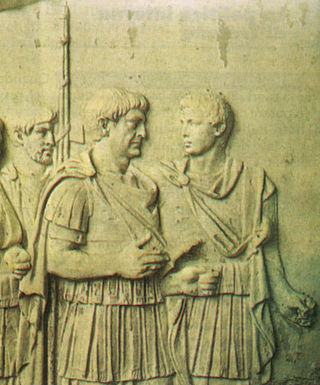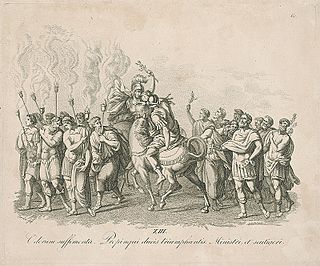Related Research Articles

Lucius Licinius Sura was an influential Roman Senator from Tarraco, Hispania, a close friend of the Emperor Trajan and three times consul, in a period when three consulates were very rare for non-members of the Imperial family. The dates of two of these consulates are certain: in 102 and 107 AD he was consul ordinarius; the date of his first consulate, as a suffect consul has been debated. Fausto Zevi postulated that he was also suffect consul in 97, based on a plausible restoration of part of the Fasti Ostienses, which reads "..]us". However, two more recently recovered fragments of military diplomas show that the name of this consul is L. Pomponius Maternus, who is otherwise unknown. Most authorities have returned to endorsing C.P. Jones' surmise that Sura was consul for the first time in the year 93. He was a correspondent of Pliny the Younger.
Quintus Sosius Senecio was a Roman senator who was favored by the emperors Domitian and Trajan. As a result of this relationship, he was twice ordinary consul, an unusual and prestigious honor: first in 99, with Aulus Cornelius Palma Frontonianus as his colleague; and again in 107 as the colleague of Lucius Licinius Sura, who was himself consul for the third time.
The gens Attia was a plebeian family at Rome, which may be identical with the gens Atia, also sometimes spelled with a double t. This gens is known primarily from two individuals: Publius Attius Atimetus, a physician to Augustus, and another physician of the same name, who probably lived later during the first century AD, and may have been a son of the first. A member of this family rose to the consulship in the early second century, but his career is known entirely from inscriptions.
Sextus Vettulenus Cerialis was a Roman senator and military commander, the 1st legate of Judaea. He was an early supporter of Vespasian, who appointed Cerialis suffect consul in either 72 or 73.
Lucius Antistius Rusticus was a Roman senator active in the later part of the first century AD. He was suffect consul for March to April 90, with Lucius Julius Ursus Servianus as his colleague.
Marcus Cornelius Nigrinus Curiatius Maternus was a Roman senator and general during the reign of Domitian. He was suffect consul during the nundinium of September to October AD 83 with Lucius Calventius Sextus Carminius Vetus. Although some experts consider him a rival with Trajan as heir apparent to the emperor Nerva, he is primarily known from inscriptions.
Titus Prifernius Geminus was a Roman senator who lived in the second century. He is best known as a friend and correspondent of Pliny the Younger, who addresses him as Geminus; he served as quaestor to Pliny for the latter's consulship in AD 100, and five letters Pliny wrote to Geminus have survived. Although the letters convey a genuine friendship between the two, the first one appears only in the latter books of Pliny's collection; Ronald Syme explains this may be due to the fact that he, like Quintus Corellius Rufus and Calestrius Tiro, were living in Rome at the same time.
Quintus Glitius Atilius Agricola was a Roman senator and general who held several posts in the emperor's service. He was twice suffect consul: for the first time in AD 97 with Lucius Pomponius Sura as his colleague, and the second time in 103 when he replaced the emperor Trajan. He is the last known person to have held two suffect consulates. Agricola is known only through a large number of fragmentary inscriptions from Augusta Taurinorum, which appears to be his home town.
Lucius Julius Marinus Caecilius Simplex was a Roman senator who held several posts in the emperor's service. Simplex was then appointed suffect consul in late 101, with Lucius Arruntius Stella as his colleague. His career is primarily known through inscriptions.

Gaius Minicius Fundanus was a Roman senator who held several offices in the Emperor's service, and was an acquaintance of Pliny the Younger. He was suffect consul in the nundinium of May to August 107 AD with Titus Vettennius Severus as his colleague. Fundanus is best known as being the recipient of an edict from the emperor Hadrian about conducting trials of Christians in his province.
Galeo Tettienus Severus Marcus Eppuleius Proculus Tiberius Caepio Hispo was a Roman senator active in the late 1st and early 2nd centuries AD, who occupied a number of offices in the imperial service. He was suffect consul around the year 101 as the colleague of Rubrius Gallus.

Quintus Pomponius Rufus was a Roman senator active in the imperial service; he was governor during the reigns of the emperors Domitian and Trajan. Rufus was also suffect consul for the nundinium September-December AD 95 as the colleague of Lucius Baebius Tullus. Pomponius Rufus is known primarily from inscriptions.
Gaius Popilius Carus Pedo was a Roman senator who held several offices in the emperor's service during the second century. He was suffect consul in succession to Tiberius Licinius Cassius Cassianus as colleague of Sextus Cocceius Severianus Honorinus until the end of 147.

Lucius Valerius Propinquus was a Roman senator active in the second century AD. He was suffect consul who replaced the ordinary consul Marcus Annius Verus and was the colleague of the other ordinary consul, Gaius Eggius Ambibulus, for the remainder of the first nundinium of 126.
(Lucius?) Plotius Pegasus was a Roman senator and jurisconsult active under the Flavian dynasty. He was suffect consul in an uncertain year, most likely 72 or 73, as the colleague of Lucius Cornelius Pusio Annius Messalla. Shortly after his ascension to the imperial throne, Domitian appointed Pegasus urban prefect, one of the most prestigious offices in a senatorial career.
Lucius Roscius Aelianus Maecius Celer was a Roman senator of the second century. He was suffect consul in the nundinium of November-December AD 100 with Tiberius Claudius Sacerdos Julianus as his colleague. Celer is primarily known from inscriptions.
Publius Pactumeius Clemens was a Roman senator and jurisconsult active during the first century AD. He was suffect consul for the nundinium April-June 138 as the colleague of Marcus Vindius Verus; according to Ronald Syme, Clemens is the earliest known consul to hold the fasces in absentia. Although he is known mostly through inscriptions, his life provides examples of how patronage operated during contemporary Rome.
References
- ↑ Alison E. Cooley, The Cambridge Manual of Latin Epigraphy (Cambridge: University Press, 2012), p. 467
- ↑ Champlin, Fronto and Antonine Rome (Cambridge: Harvard, 1980), p. 146 n. 45
- ↑ Syme, "Spaniards at Tivoli", Ancient Society, 13/14 (1982/1983), p. 250
- ↑ John Grainger, Nerva and the Roman Succession Crisis of AD 96–99 (London: Routledge, 2003), p. 121
- ↑ CIL XIV, 3597
- ↑ CIL XIV, 2243
- ↑ Eck, "Jahres- und Provinzialfasten der senatorischen Statthalter von 69/70 bis 138/139", Chiron , 12 (1982), pp. 322-324
- ↑ Eck, "Jahres- und Provinzialfasten", pp. 328f
- ↑ Leunissen, "Direct Promotions from Proconsul to Consul under the Principate", Zeitschrift für Papyrologie und Epigraphik , 89 (1991), p. 221
- ↑ Grainger, Nerva, pp. 100f